We all loved her. We all admired her. And we all knew this day would come.
NICHELLE NICHOLS, the amazing actor and person who helped raise women and people of color to new heights of recognition and self-confidence at a critical time in American history, has passed away at the age of 89 from natural causes.
As happens with many people as they approach their tenth decade of life, Nichelle had grown frail and was losing her memory. Her voice was no longer able to serenade us with the melodies of the stars as it did for most of her career. She had recently completed her “farewell tour” of conventions and public appearances with her fans and was living her final years with her son and his family in New Mexico.
But we still loved her.
And it was a love that had been there, for many of us, over the course of decades. She was always Lieutenant (and later Commander and, in fan films like OF GODS AND MEN and RENEGADES, Captain and even Admiral) Nyota Uhura.
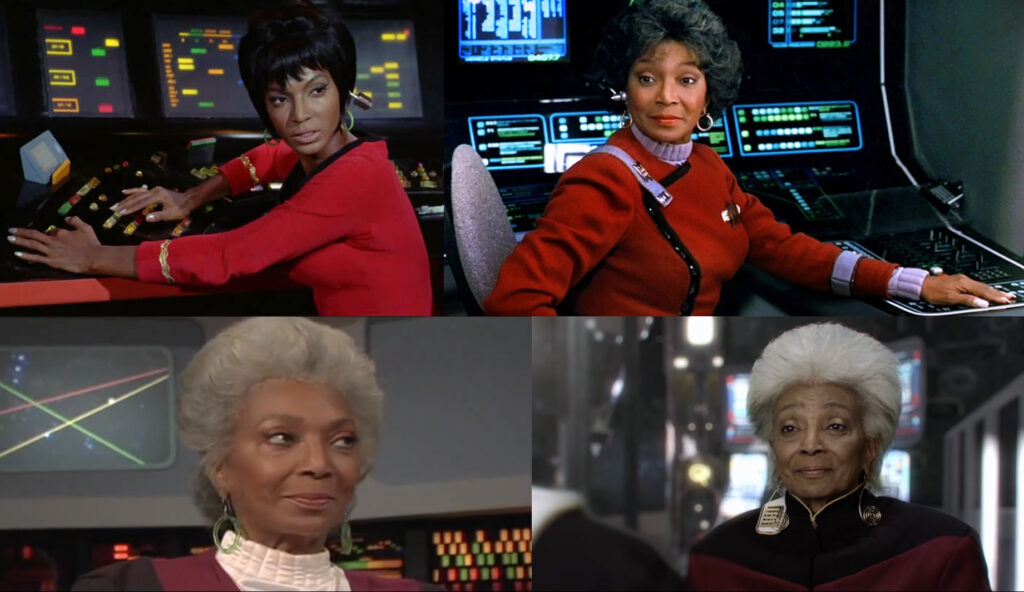
In the TOS episode “Is There In Truth No Beauty?” it is revealed that the name Uhura means “freedom.” Indeed, it is the Swahili word “Uhuru” that means freedom, and according to Nichelle’s 1994 autobiographical Beyond Uhura, she was carrying the 1962 book Uhuru by Robert Ruark when she read for the part in Star Trek. Later, producer ROBERT JUSTMAN reportedly told GENE RODDENBERRY what Uhuru meant, and Gene decided to name his African communications officer Uhura right then and there.
The character’s first name, Nyota, came years later in 1982, following the release of Star Trek II: The Wrath of Khan. Author WILLIAM ROSTLER was writing the licensed paperback Star Trek II: Biographies telling the personal histories of the seven main TOS characters, including Uhura. Rostler contacted Gene and Nichelle directly asking both for permission to give Uhura the first name Nyota, which means “star” in Swahili. They both approved, and since it was a licensed book, Nyota became as official as anything not shown on film. Indeed, a few years later, the 1985 Star Trek novel Uhura’s Song by JANET KAGAN (still one of the best!), became the second licensed product to use that first name for Uhura. However, it wouldn’t be until 2009 and the release of the first rebooted Star Trek film with ZOE SALDANA taking on the iconic role, that Nyota officially became “canon” when Spock calls Uhura by her first name during the movie.
I remember seeing Nichelle during countless conventions, always talking about how moved and excited she was to learn that Nyota meant “star” and that Nyota Uhura meant “Freedom Star” or “Star of Freedom,” guiding those suffering under prejudice, discrimination, and persecution to a brighter future. And goodness knows, Nichelle did just that!
We all know the story that Nichelle would tell of how, in 1967, she had decided to leave the Star Trek series and return to her true love, musical theater, having been offered a role on Broadway. She handed Roddenberry her resignation letter on a Friday afternoon, and he insisted that she take the weekend to think it over before making her decision final.
On Saturday evening, while attending a banquet being hosted by the NAACP, she was told there was “a big fan” who desperately wanted to meet her. I can’t tell the story any better than she did, so here’s Nichelle’s own words…
I thought it was a Trekkie, and so I said, ‘Sure.’ I looked across the room and whoever the fan was had to wait because there was Dr. MARTIN LUTHER KING walking towards me with this big grin on his face. He reached out to me and said, ‘Yes, Ms. Nichols, I am your greatest fan.’ He said that Star Trek was the only show that he, and his wife Coretta, would allow their three little children to stay up and watch.
Nichelle then told him about her decision to leave the series at the end of the first season.
I never got to tell him why, because he said, ‘You cannot, you cannot…for the first time on television, we will be seen as we should be seen every day, as intelligent, quality, beautiful, people who can sing dance, and can go to space, who are professors, lawyers.” Dr. King Jr went further stating, ‘If you leave, that door can be closed because your role is not a black role, and is not a female role, he can fill it with anybody even an alien.’
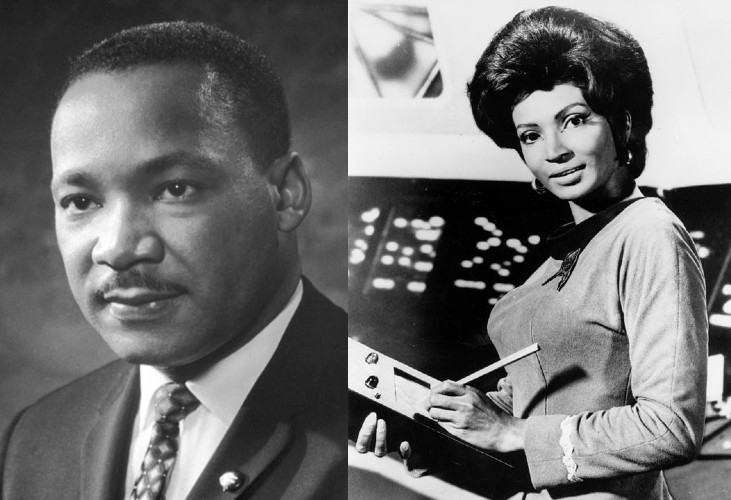
And here’s where my eulogy hits a major speed bump. You see, I was born in the same year that Nichelle and Dr. King had this conversation. I grew up in the 1970s. And I was raised in a white family as a white male child of privilege. We weren’t rich with mansions and yachts, but a white upper middle class Jewish kid in New York City was never, ever going to experience the kind of struggles and adversities that even the most upscale and successful Black person (especially women but also men) in America would face in the 1970s (and, sadly, even today). And for this reason, I can’t begin to truly comprehend the significance of the effect Nichelle had on Blacks, other minorities, and women at such a critical time as the era of civil rights in the 1960s and women’s liberation in the 1970s.
As such, I won’t try to explain Uhura’s effect on me personally aside from saying that, honestly, I never really even noticed that she was Black! Oh, of course, I could see the color of her skin. But I never NOTICED it. And indeed, that was exactly was Gene Roddenberry was trying to accomplish. While Star Trek‘s primary audience at the time it first aired was people who had grown up in an America where racism and segregation were common, tolerated, and even widely accepted, it was also a show for kids like me. It showed us, in a matter-of-fact, no-big-deal way, that Black people—indeed, a Black WOMAN (along with Asians and other people of ethnicities)—could rise to positions of prominence and respect just like white men.
For us kids, seeing “different” people like Uhura and Sulu and Spock on the bridge was even more important. It was completely normal. And as I watched reruns and saw television’s first interracial kiss on a TV series in the episode “Plato’s Stepchildren,” I never thought anything of it. Kirk kisses women all the time, why would there be any fuss about him kissing Uhura?
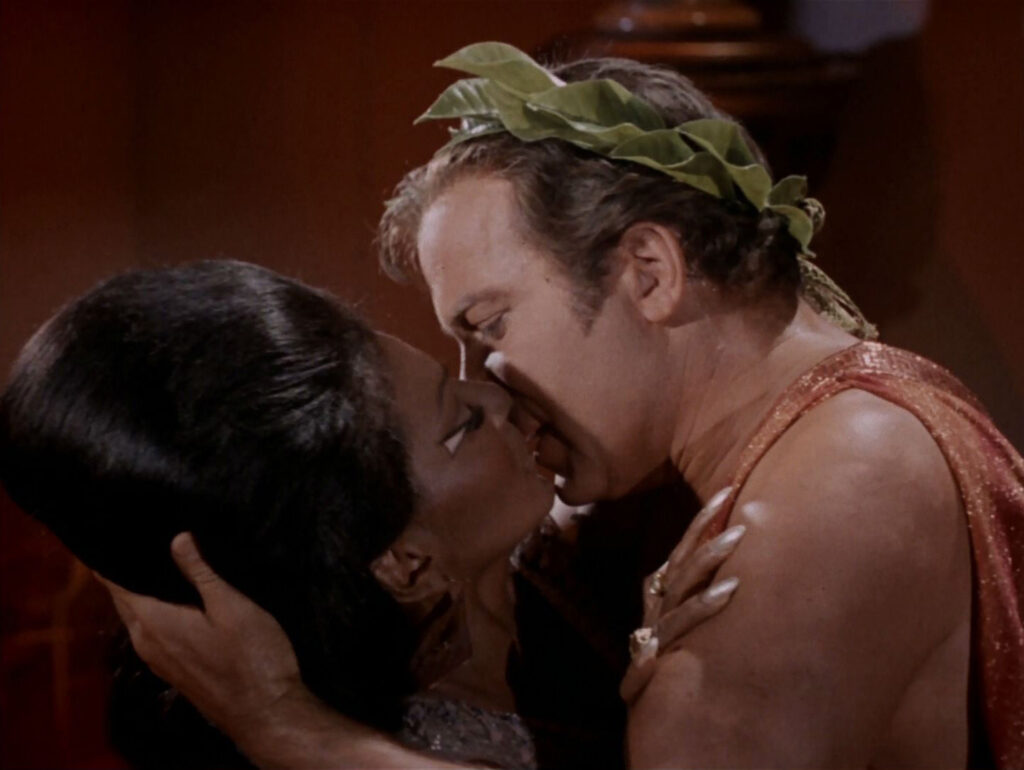
I firmly believe—as I think Gene did—that racism, prejudice, and intolerance are TAUGHT and LEARNED. But Star Trek taught me the opposite: tolerance, equality, open-mindedness to other cultures and traditions…and those were the lessons I learned.
I’m sure some out there would say that Star Trek “indoctrinated” me into growing up as a woke, bleeding heart liberal. But I truly believe that, with the help of Nichelle Nichols and the example she provided, Star Trek “freed” me from all of those who might otherwise have taught me to hate, to resent and fear others who are different, and to embrace the voices of division and discrimination.
After Star Trek went off the air in 1969, Nichelle went on to her next greatest achievement…and I don’t mean voicing many of the female characters (including Uhura) in Filmation’s animated Star Trek series in 1973-74. No, I’m referring, of course, to her work with NASA in recruiting minority and female applicants for the U.S. space program. In this way, I suppose it was fitting that Uhura was the Chief of COMMUNICATIONS, because her voice and efforts were able to turn the outreach program into a huge success. Among the people she helped bring in to NASA:
- DR.. SALLY RIDE, the first American female astronaut,
- Colonel GUION BLUFORD, the first African-American astronaut,
- Dr. JUDITH RESNIK and Dr. RONALD McNAIR, who both flew successful missions during the Space Shuttle program before their deaths in the Challenger disaster on January 28, 1986,
- CHARLES BOLDEN, former NASA administrator and veteran of four shuttle missions,
- FREDERICK D. GREGORY, former deputy administrator and a veteran of three shuttle missions,
- LORI GARVER, former deputy administrator.
And of course, perhaps the most significant person Nichelle recruited for the space program was DR. MAE JEMISON, who became America’s first-ever female African-American astronaut. Take a few minutes to watch this video of the impact Nichelle had on this incredibly impressive woman…
As the video chronicles, Mae Jemison went on to appear in the season six Star Trek: The Next Generation episode “Second Chances,” directed by another African-American, LEVAR BURTON. And Nichelle was there that day, completing this amazing circle.
Of course, one of the most iconic photos of Nichelle with a prominent African-American came in April 2012 in the Oval Office when she posed with President Barack Obama, the first person of color to be elected to the highest office in our land. And for Star Trek fans, it wasn’t simply that Lieutenant Uhura was in the White House standing next to the president but that they BOTH were giving the Vulcan hand salute…live long and prosper, indeed!
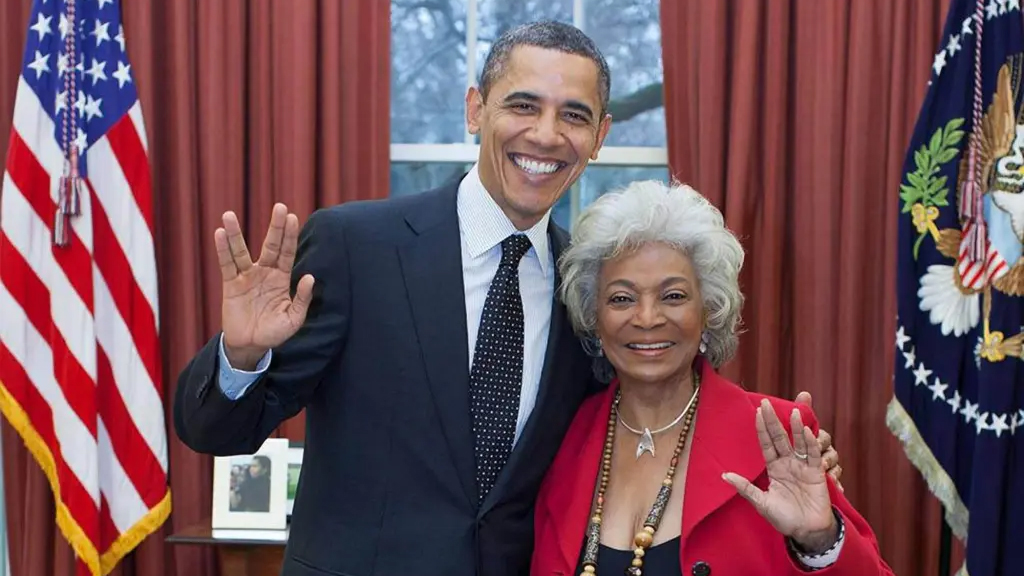
I’ll finish this tribute eulogy with a personal memory of Nichelle along with an odd piece of synchronicity.
The synchronicity came yesterday, perhaps at the very moment that Nichelle passed away (although I can’t know for certain). As a judge for the 2022 Star Trek Fan Film SHOWRUNNER AWARDS, I am making my way through all 38 of the submissions, rewatching each one in alphabetical order before the August 15 voting deadline. Last evening, I began viewing the 2020 release STAR TREK: FIRST FRONTIER, which begins with Nichelle reciting an introduction to the film in much the same way that WILLIAM SHATNER (and others) have provided the “Space, the final frontier…” monologue. And I thought about Nichelle and how much she has given of herself to fans over the years, appearing at too many conventions to count, signing autograph after autograph, speaking to students, scientists, dignitaries, and others…and always smiling that warm, confident, and elegant smile.
Even in her later years—and I saw her at many local events after I moved to Los Angeles in 1993—Nichelle never looked as though she wanted to be anywhere other than where she was at that moment. The love we fans gave to her was always retuned.
And that leads me to my final memory of Nichelle. It was November 1, 2015, and I was taking my then-5-year-old son Jayden to his first-ever sci-fi and comic book convention. The chairs from the TNG bridge were set up against a hanging background image for photos, and Jayden was climbing all over the chairs. At the time, he hadn’t seen TNG yet, and we’d only just started watching TOS together. However, I’m certain that he had no idea who the two old people were when Nichelle walked over with WALTER “Chekov” KOENIG, along with their publicist, to take a photo.
“Jayden,” I said, “get off the chair and let Lt. Uhura and Mr. Chekov take a picture.”
“Oh, no,” Nichelle said to Jayden, “You stay right where you are, young man! We’ll take a picture with you!”
And so I did…
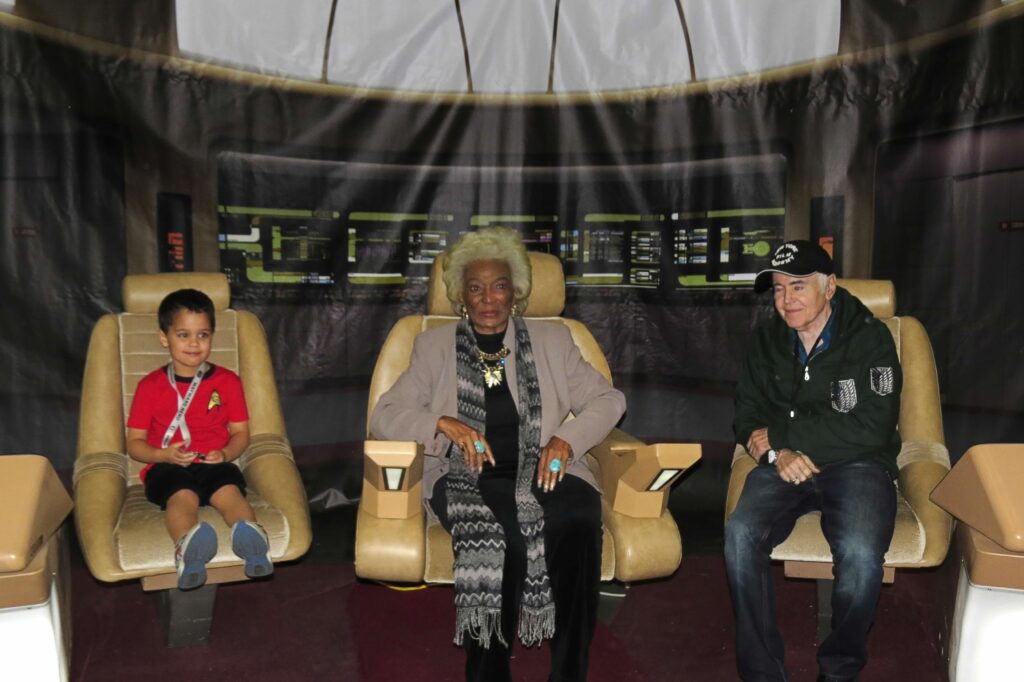
Then I got Jayden out of the chair so Nichelle and Walter could have a photo to themselves. But for me, that one moment will be how I remember Nichelle: sweet, warm, loving, and always gracious to her fans.
Hailing frequencies closed…

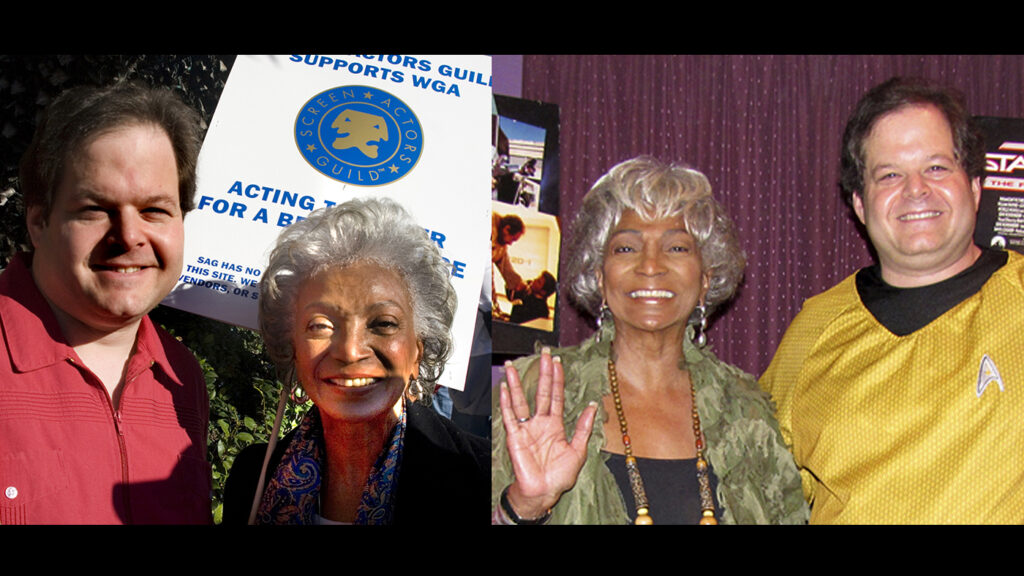
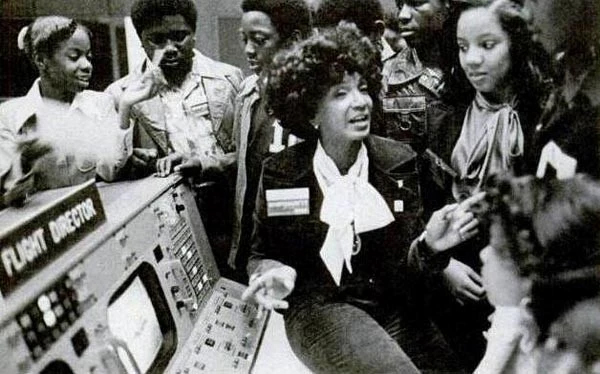
Well Done sir on a fine tribute to Nichelle Nichols.
She deserved it. 🙂
Thank you for writing such a beautiful tribute for such a beautiful woman who ended up doing so much for so many. She now is free among the stars. RIP dear Lady Nichelle
She was, truly, a gift to all of us fans.
OMW! I’ve been sad ever since I heard the news earlier today but, as you said, it was “expected” considering her age and health. However, yours the first eulogy I’ve read. It was good and, amazing to this 72 yo Trek fan, I learned a few new things.
Then, your story with your son caught me “off guard” and, coming from an unexpected direction, left me bawling. Thank you for helping me mourn an amazing woman.
Yeah, I’ve cried a bit myself today, as well.
A very fitting eulogy. I will miss her very much. R.I.P.
Nichelle Nichols was one of my favorite Star Trek actors. Her grace, warmth and humor were unique. Rest in peace Lieutenant.
Thanks for the moving post, Jonathan.
“For us kids, seeing “different” people like Uhura and Sulu and Spock on the bridge was even more important. It was completely normal.”
Yes, normal, as a vision of the future when race, gender and other such divisions have become utterly unimportant. And for me it was even more an inspirational view of the future when the Declaration of Independence’s “self evident truths” have become a fully realized living reality and not something to hope to see someday.
Beautifully put, my friend. I don’t have your stories of her to tell, but even if I did I might not have conveyed them as well. Clear skies, Nichelle.
Thanks, Tim. I miss ya, buddy!
I remember seeing her at a convention at Pensacon many years ago I even got to ask a question myself .